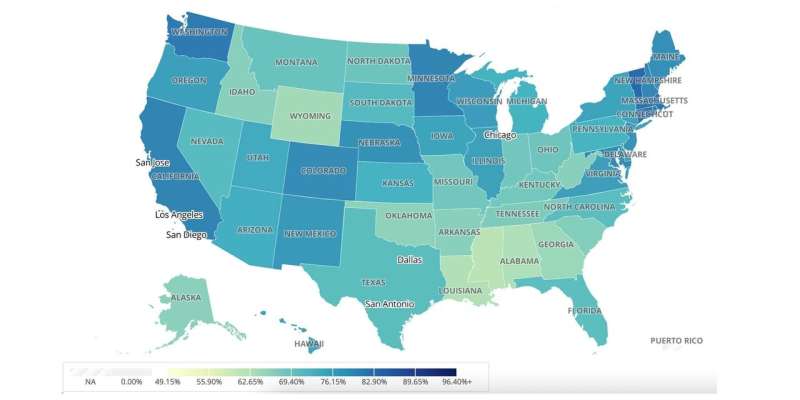
Carnegie Mellon University researchers have begun daily nationwide surveys to determine U.S. acceptance of COVID-19 vaccines and pinpoint those states and localities where people are most skeptical of the shots.
The CMU surveys, which Facebook distributes daily to a portion of its users, thus far have shown that the greatest resistance to the vaccine is in the Deep South, while people in the Northeast and West Coast are the most inclined to receive the vaccine, if it were available to them.
Among over one million respondents who have taken the survey nationally since late December, 71% indicate that they would definitely or probably receive the vaccine if it were offered to them. The rate exceeds 80% in states such as Vermont, Massachusetts, Connecticut and Washington, and is more than 88% in the District of Columbia. Some states, including Mississippi, Louisiana and Alabama, have rates under 65%, suggesting much lower acceptance of the vaccine in their populations.
The deep disparities in the findings are consistent with previous public surveys, said Alex Reinhart, assistant teaching professor in the Department of Statistics and Data Science and a member of the Delphi Research Group that conducts the surveys. The power of the CMU surveys, he added, is that they are distributed to a wide swath of Facebook users each day, enabling researchers to track changes in attitudes in real-time as the pandemic progresses and vaccine distribution continues.
“County, state and federal public health officials can use this information to better guide their public relations and vaccine distribution efforts,” Reinhart explained. The aggregated results of this and other COVID-19 survey questions are publicly available on CMU’s COVIDcast website.
CMU began the daily surveys last April, asking people if they had COVID-19 symptoms, and more than 15 million people have answered the surveys since then. The results provide county-level information about the coronavirus pandemic that is updated continuously and available from no other source. Delphi researchers use that information to forecast changes in COVID-19 activity across the country, helping to guide responses by health care providers.
The survey was expanded Dec. 19 to include a question on whether the respondent would get a COVID-19 shot if it was available; a second question asking whether they had received a shot was added Jan. 6. In collaboration with the U.S. Centers for Disease Control and Prevention, the researchers plan to soon ask respondents who don’t want the vaccine to say why not.
Facebook distributes the surveys as part of its Data for Good program and this data is made available to support public health responses to the pandemic. Facebook does not receive any individual survey information from users—CMU conducts the surveys off Facebook and manages all the findings. The University of Maryland likewise works with Facebook to gather international data on the pandemic.
Source: Read Full Article
